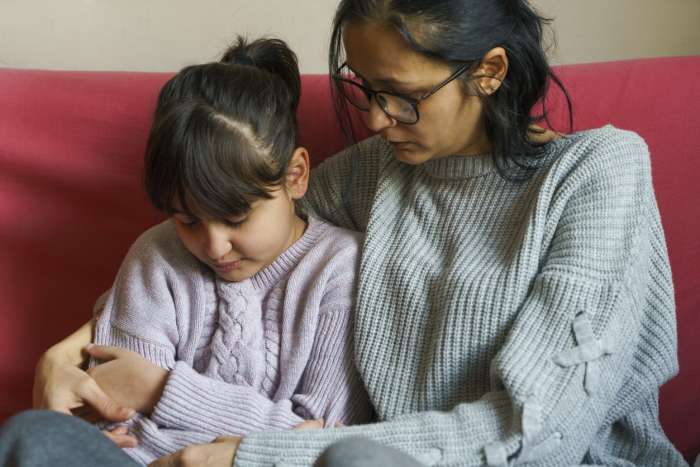Being a survivor of childhood trauma can bring its own unique set of challenges to parenting. While we may wish to leave our trauma histories behind us, those experiences still lurk in the back of our minds. They can even influence how we parent our children.
That’s why parents who experienced childhood trauma need to learn how to best raise emotionally secure kids.
In this article, trauma experts provide insight to help you learn from your own adverse childhood experiences. With the right help and support, it’s possible to break the cycle of abuse and end generational trauma.
How Does Childhood Trauma Affect Your Parenting?
The Diagnostic and Statistical Manual of Mental Disorders (DSM) V defines childhood trauma as “exposure to actual or threatened death, serious injury, or sexual violence.” This includes direct exposure to trauma, witnessing a traumatic event, and/or learning about something traumatic that happened to a loved one or family member.
Esther Goldstein, LCSW, Trauma Psychotherapist, EMDR Consultant, Founder and Owner of Integrative Psychotherapy, shares that there are two types of childhood trauma:
- The trauma of commission: a trauma where something happened. These types of trauma include physical harm, sexual abuse, domestic abuse, and vehicular crashes.
- The trauma of omission: a trauma where something didn’t happen. These types of trauma include not receiving basic human needs, and lacking comfort, physical touch, and support.
Traumatic experiences can be further broken down into two categories: “small t” and “Big T” traumas.
Repairing the Mother-Daughter Relationship
Repairing the Mother-Daughter Relationship Building Blocks A belief system is composed of fundamental ideas that affect how an individual looks at and evaluates a set of circumstances, experiences, or individuals. Indeed it colors the overall way in which one looks at and approaches the world around them. Read More
“Big T” traumas refer to highly distressing events, such as war, near-death experiences, sexual abuse, and physical abuse.
“Small t” traumas are experiences that overwhelm the mind or body. These may seem less dramatic, but they cause feelings of intense distress. “Small t” traumas include emotional abuse and chronic stress. These situations can cause long-term effects, such as perpetual feelings of overwhelm.

"Trauma often gets buried until something kicks it up to the surface — starting a family can often be the catalyst, causing our past pains or traumas to resurface,” explains Goldstein.
When someone has experienced trauma during their early years, it can deeply impact the way they approach parenting.
For example, if a person grew up in an environment where they didn’t feel safe or had unstable relationships, they may struggle to form secure attachments with their own children. Individuals who experienced childhood trauma may have difficulties in emotional regulation and tolerating negative emotional states.
Parenting is not an easy journey. It can be overwhelming and challenging, with a host of stressors. Parents who had traumatic childhood experiences are more likely to have a disproportionate response during stressful situations. In turn, their children learn unhealthy patterns of emotional regulation.
These parents do not intentionally react emotionally or in a neglectful manner. But the unresolved pain and coping mechanisms from their past can get in the way of the consistent care that their children need.
What is Generational Trauma?
Generational trauma is a concept that hits close to home for many of us. It refers to the psychological and emotional impact of traumatic events experienced by one generation, which are transmitted to subsequent generations.
The painful events experienced by our ancestors can have lasting effects on our own mental and emotional well-being.
It's like passing down a family story, but instead of a happy memory, it's emotional scars and struggles that get passed along. Traumatic events like child abuse, violence, and oppression leave deep imprints on our family's history and shape how we handle stressors. It's a ripple effect: what our great-grandparents went through can influence how we behave today.
Generational trauma can show up in different ways, from feeling anxious or depressed to coping with substance abuse. Breaking the cycle of generational trauma is crucial for healing and fostering a brighter future for everyone.

How Does Parenting Trigger Past Trauma?
Heather Toews, Registered Clinical Counsellor specializing in trauma therapy supporting individuals in recovering from childhood and other complex traumas, explains that pain from our early intimate relationships acts as triggers for unprocessed, unconscious pain.
“We then project that pain from the past onto our relationships today. This pain then becomes intergenerational. This can be triggered by our child’s age,” adds Toews.
For example, if we experienced childhood trauma at age 6, having a 6-year-old child may trigger us.
Toews explains that our memories are explicit and implicit which means “we can have conscious recollections of some memories and other memories are more fragmented and stored without context and are wordless.”
The memories that live outside of our awareness often come out as triggers. But since these occurred in the context of a relationship, they also get triggered in the context of a relationship such as the one between a parent and a child.
“As much as pain is intergenerational, so is healing,” shares Toews.
Babies and Infants
The infant stage can be an overwhelming and stressful experience for many first-time parents. Caring for a newborn comes with a multitude of challenges, from sleepless nights to constant feedings and diaper changes.
The demands of parenting an infant can lead to elevated stress levels. This may impact a parent's emotional and mental well-being. Increased stress levels can trigger parents and cause heightened irritability and emotional reactivity.
Toddlers
Toddlers are known for their boundless energy, curiosity, and emerging independence. Parents may find themselves navigating temper tantrums, defiance, and frequent mood swings. Parents need to keep a close eye on toddlers as they can quickly get into trouble.
Parents with childhood trauma may over-shelter their children. They fear what happened to them will also occur to their own child.
Child
Parents with a history of trauma may emotionally separate from their children as they struggle to regulate their own emotions. As a result, they experience dissociation and cannot tolerate moments when their child shows vulnerability or expresses strong emotions.
Teen
As children learn more about the world, they begin to form their own opinions. Trauma can cause an individual to feel like they do not have control over what happens to them. This creates an extreme fear of uncertainty.
Parents with unresolved trauma may avoid talking about taboo topics with their teenagers. They may try to compensate for their anxiety by controlling their children and limiting the types of experiences they have.
Tips on How to Cope and Manage Triggers

There are many ways to manage triggers as a parent with a history of childhood trauma. Toews suggests the following tips:
1. Look Inward
Use your parenting experiences to learn. Ask yourself: What am I triggered by? Extreme reactions can be fuelled by unresolved past trauma.
Remember, it isn't about what happened to you as a child, but how you cope with this trauma now. We often get triggered by the particular age of our children and find ourselves doing the very things to our children that felt hurtful to us as a child.
2. Know Yourself
To repair our ability to connect to our children we need to develop inner security as adults. Dr. Daniel Siegel refers to this as a “coherent narrative." A coherent narrative is a deep understanding of who you are, what is happening to you, and why this is happening throughout your life story.
3. Regulate Your Emotions
We learn regulation from being regulated. So if we didn’t receive that, we won’t be able to do this without relying on external factors (i.e. food, alcohol, zoning out).
Find people to share the burden of life with. Others can show you the experience of care and understanding--reshaping your regulation abilities.
It is best to regulate your emotions before addressing an issue with your child(ren), outside of immediate safety issues. Sometimes taking three deep breaths can mean all the difference between a reaction and a response.
4. Develop Emotional Language
Giving language to your emotions allows your nervous systems to calm down and return to baseline.
5. Practice Self-Compassion
Remember you didn’t get to where you are overnight, and it will take you time to get out of it. Offer yourself compassion.
I believe that the best parenting strategy is an apology. It teaches our children that nobody is perfect and we are all only human.
Cultivating self-compassion is essential, as it allows parents to acknowledge that their struggles are not a reflection of their worth, but rather a consequence of the pain they endured.
6. Learn New Skills
We don’t know what we don’t know until we know it. If your parenting strategies aren’t working for your child, learn new ways of parenting. I always recommend searching out attachment-based trauma-informed parenting strategies.
How to Break the Cycle of Abuse as a Parent

Seeking therapy can help you gain insight into how past trauma affects your parenting style. Professional support can teach you coping strategies to address challenges.
Child-Parent Psychotherapy (CCP)
Goldstein explains that Child-Parent Psychotherapy (CCP), a therapeutic model designed by Selma Fraiberg, can help both the primary caregiver and their child heal from trauma together.
CCP is for children who have experienced trauma, mental health, or behavioral concerns. CCP sessions include both the primary caregiver and the child. Primarily based on the attachment theory, CPP understands the importance of how a baby connects to their primary caregiver. It also includes components from psychodynamic, developmental, and behavioral theories.
CPP focuses on strengthening the parent-child relationship. It isn’t about a therapist swooping in to cure the child. Instead, it encourages the primary caregiver to provide safety and soothing to their distressed child. Utilizing play therapy, a therapist supports the primary caregiver in helping their child make sense of past traumas. CCP helps the primary caregiver gain a greater level of understanding of what hardships they have been through.
“Understanding and making sense of our trauma allows us, as parents to consciously choose how we would like to relate to our children and recognize that most often, our child/children’s behaviors may be an attempt to protect themselves from scary or painful experiences.
It allows parents [to have] more compassion for their children and provides them with skills for responding to challenging behaviors. The primary goal of Child-Parent Psychotherapy is to cultivate a healthy relationship between the child and caregiver, through which both the child can regain wellness and optimal functioning,” explains Goldstein.
The impact of childhood trauma on parents is not set in stone. The first step towards building a healthier parent-child relationship is to understand the effect of one's own childhood experiences.
With the right support and a commitment to self-growth, parents can create a nurturing environment for their children and provide them with the care they need for healthy child development.


